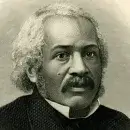
James McCune Smith
James McCune Smith was a physician, scientist, apothecary, abolitionist, essayist, and the first African American to earn a medical degree and to run a pharmacy. Smith pioneered the use of medically based statistics to challenge the notion of African American racial inferiority.
Born in Manhattan to an enslaved mother, he was educated at the African Free School, where at just eleven years old he wrote and delivered a speech to the Marquis de Lafayette during his 1824 tour of the United States. Leaving the United States because no institution of higher education would accept him, Smith studied at the University of Glasgow in Scotland from 1832 to 1837, receiving a B.A. (1835), M.A. (1836), and Doctor of Medicine (1837) degrees with honors, and was given a prestigious clinical residency in Glasgow’s Lock Hospital. Smith then went to Paris for further medical training.
After he returned to New York, he served as the physician for the Colored Orphan Asylum in Manhattan for twenty years. He also served as the community dentist and pharmacist. Smith had a racially integrated medical practice, the first in the United States run by a university-trained Black physician.
He wrote numerous scientific articles and pamphlets. He was a prominent opponent of phrenology and among the first to apply demographic and medical statistics to debunk phrenology and other forms of scientific racism. Smith also challenged the racial theories presented in Thomas Jefferson’s Notes on the State of Virginia. He was a founding member of the New York Statistics Society in 1852. In 1854, he was elected a member of the recently founded American Geographic Society.
Smith participated in many efforts to build institutions among African Americans and he played a leading role in the establishment of literary and educational societies, mutual relief organizations, and antislavery agencies. A member of the American Anti-Slavery Society, with Frederick Douglass he helped start the National Council of Colored People in 1853, the first permanent national organization for Blacks. Smith was one of the Committee of Thirteen, organized in 1850 in Manhattan to resist the newly passed Fugitive Slave Law by aiding refugee slaves through the Underground Railroad. In the mid-1850s he helped found the Party of Radical Political Abolitionists.
His notable publications include A Lecture on the Haytian Revolution (1841), The Destiny of the People of Color (1843), and introductions to Frederick Douglass’s second autobiography My Bondage and My Freedom (1855) and Henry Highland Garnet’s Memorial Discourse (1865). In 1863, Smith was appointed professor of anthropology at Wilberforce College in Ohio, but was too ill to take the position.